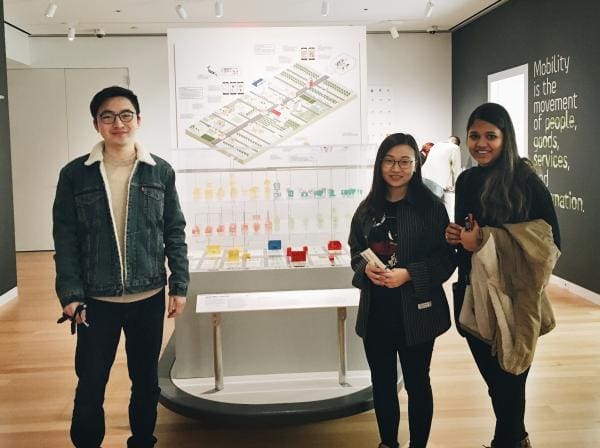Systems Design Thinking Project Spotlight
Which Way Forward? Equitable Mobility for Detroit in 2030
Systems Design Thinking Students Wei Wang, Kailing Wang, Zeping Wang, Shriya Garg, and Transportation Design students Woonghee Chung, Fei Xei, Dong Wu, and Jan Moeller
Detroit’s mobility ecosystem — how citizens get from one place to another — has been a source of concern for decades.
A joint project by the College for Creative Studies (CCS), Design Core Detroit, Ford Motor Company and the communications agency GTB has, since fall 2017, been tackling this concern in the 2030 Detroit Equitable Mobility project. The two project outcomes Scenario Design and Service Design, created by CCS graduate students, were featured at the Cooper Hewitt, Smithsonian Design Museum in the exhibition, The Road Ahead: Reimagining Mobility and at the Detroit Design 139 INCLUSIVE FUTURES EXHIBITION.

The project consists of two phases. Led by CCS Professor and Chair of MFA Systems Design Thinking Maria Luisa Rossi, students in the first phase (MFA Systems Design Thinking and MFA Transportation Design) focused on education, health, employment and socialization among Detroit’s residents to develop three long-term mobility scenarios (potential solutions), “Placemaking,” “Entry Point,” and “Care Exchanging.
In the second phase of the project, students from MFA Systems Design Thinking worked with Detroit nonprofit Focus: HOPE, using co-creation sessions to identify community needs and priorities and validate the services.
The CCS student scenarios appearing in the Road Ahead exhibition at the Smithsonian Design Museum were among 40 projects developed all over the country exploring topics around the future of mobility and the urban environment.
Scenario Design
This design illustrates three long-term equitable mobility design scenarios – Entry Point, Place-making and Care Exchange – that aim to improve the work prospects, youth retention rates, and health outcomes for under-served Detroit neighborhoods in the future.
Credits: Maria Luisa Rossi with Wei Wang, Kailing Wang, Zeping Wang, Shriya Garg, and Transportation Design students Woonghee Chung, Fei Xei, Dong Wu, and Jan Moeller


This design scenario presents four service design concepts: Soft skill education (yellow), student outcome (pink), care exchange (green), and health data collection (blue).
Each icon on the model represents a service touch-point, which informs the designer where to enhance the user/provider experience.
Credits: Maria Luisa Rossi with Wei Wang, Kailing Wang, Zeping Wang and Shriya Garg
JOIN THE EVOLUTION
CCS prepares students to enter a global economy in which creativity shapes better communities and societies. Here, creative minds can both explore and thrive. There is nothing like it anywhere in the world.
